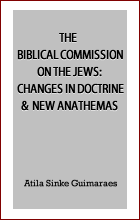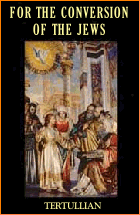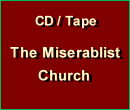Consequences of Vatican II
 |
 |
 |
 |
 |
 |
 |
Conciliar Church & Judaism - III
Christ’s Divinity Is Denied to Unite
with the Jews
Two very significant de facto changes made to the traditional Catholic Faith as a consequence of the conciliar Church's strong concern for the fate of the Jews in the so-called Holocaust were proclaimed by Card. Ratzinger while head of the CDF. In his book God and the World, 2000, he wrote:
“Their (the Jews') ‘no’ to Christ brings the Israelites into conflict with the subsequent acts of God, but at the same time we know they are assured of the faithfulness of God. They are not excluded from salvation.” (1)
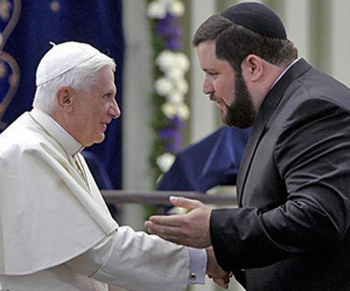
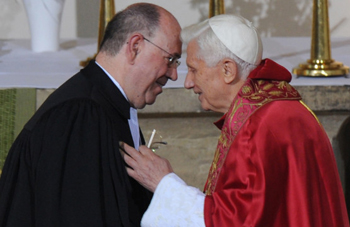 Approximately a year later on September 29, 2000, the cardinal extended the lack of necessity of Jews to acknowledge Jesus is the Son of God to include believers of other sects such as Muslims, Buddhists, Shintoists, Animists, etc. He proclaimed:
Approximately a year later on September 29, 2000, the cardinal extended the lack of necessity of Jews to acknowledge Jesus is the Son of God to include believers of other sects such as Muslims, Buddhists, Shintoists, Animists, etc. He proclaimed:
“[We] are in agreement that a Jew - and this is true for believers of other religions - does not need to know or to acknowledge Christ is the Son of God in order to be saved.” (2)
On August 19, 2005, at an ecumenical meeting in Cologne devoted to seeking unity among all religions, he again emphasized the lack of necessity to acknowledge that Jesus is indeed the Son of God, by proclaiming it is no longer necessary to convert members of non-Catholic sects to the Catholic Faith. He stated:
“On the other hand, this unity does not mean what could be called ecumenism of return, that is, to deny and to reject one's own faith history. Absolutely not !” (3)
Such statements bluntly contradict these words of Jesus Christ who said:
“I am the way, and the truth, and the life. No man comes to the Father, but through me,” (Jn. 14:6) and
“If anyone loves me, he will keep my word, and my Father will love him, and will come to him and make our abode with him. He who does not love Me, does not keep my words. And the word that you have heard is not mine, but the Father’s who sent Me.” (Jn 14: 23-31)
Pope Ratzinger’s statements are remarkable in that the first statement was made when he was a cardinal and head of the CDF and the second statement was made when he was Pope. These statements assert one may contradict the words of God and God will welcome him/her into His heaven for all eternity!
Card. Kasper, then Secretary of the Pontifical Council for the Promotion of Christian Unity, echoed the Pope’s words when he said:
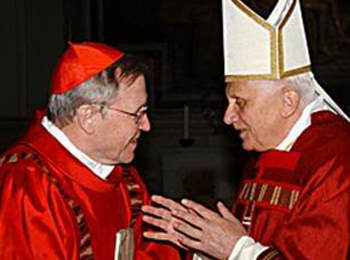 “Today we no longer understand ecumenism in the sense of return, by which others would be converted and return to being Catholics. This was expressly abandoned at Vatican II.” (4)
“Today we no longer understand ecumenism in the sense of return, by which others would be converted and return to being Catholics. This was expressly abandoned at Vatican II.” (4)
Such statements are in obvious contradiction with the thrice defined ex-cathedra pronouncement “extra ecclesiam nulla salus,” that is, “outside the Church there is no salvation.”
The first pronouncement was made by Pope Innocent III at the Fourth Lateran Council in 1215, the second pronouncement by Pope Boniface VIII in the Bull Unam Sanctam in 1302, and the third and by far the most encompassing pronouncement was made by Pope Eugene IV in the Bull Cantate Domino in 1441 just prior to the Council of Florence in 1442.
An insult to God
Notwithstanding the immutable prior magisterium of the Church, the PBC-published book approved by Card. Ratzinger contains the following two statements:
• “The Jewish messianic wait is not in vain.” and
• “Jews and Christians share their wait for the Messiah, although Jews are waiting for the first coming and Christians are waiting for the second coming.”
This is, however, what God said about His only Son:
• “This is my beloved Son with whom I am well pleased” (Mk 3:17) and,
• “Thou art my beloved Son in whom I am well pleased.” (Mk 1:11)
Each of the PBC statements are a clear insult to God since each statement says God will accept a person even if he denies the words of God Himself!
The insult is made even more evident in light of teachings from the Talmud, a book considered to be a central text of Rabbinic Judaism, which contains the doctrines, laws, and commentaries made by the most expressive rabbis throughout History. Some of the teachings are:
• “As they await the coming of the messiah, Jews live in a state of continuous war with the other peoples. When the victory is definitive, the peoples will accept the Jewish faith, but it is only the Christians who will not participate in this grace. On the contrary, they will be completely annihilated, because they descend from the Devil”:
• “Whoever loves a Christian would hate his own creator”;
• “The kingdom of Rome however, must be exterminated, because when corrupt Rome is destroyed, salvation and freedom will come to God’s chosen People.” (5)
In Obadiam, Rabbi David Kimchi wrote: “For when Rome is destroyed, Israel shall be redeemed.”
Reiterating Rabbi Kimchi’s words, Rabbi Abraham wrote in his book Tseror Hammor: “Immediately after Rome is destroyed, we shall be redeemed.” (6)
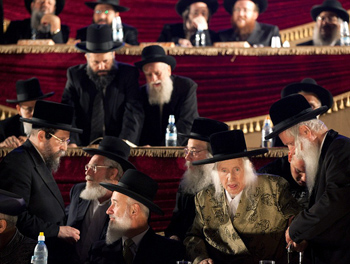 The Talmud remains a principal religious guide for Jews and contains many other insulting and demeaning statements about Christians and non-Jews. Thus, it is indeed inexplicable that conciliar Church authorities proclaim Judaism is salvific in and of itself and yet raise no objection to Jews adhering to such teachings in the Talmud.
The Talmud remains a principal religious guide for Jews and contains many other insulting and demeaning statements about Christians and non-Jews. Thus, it is indeed inexplicable that conciliar Church authorities proclaim Judaism is salvific in and of itself and yet raise no objection to Jews adhering to such teachings in the Talmud.
Even more inexplicable is the conciliar Church asserting that Judaism is salvific while remaining silent about the many references in the Talmud condemning the members of the Church established by Jesus Christ, the One who will be the Judge of eternal welfare of all souls.
Further, the statements of Pope Ratzinger and those in the PBC publication are a denial of the divinity of Christ since they imply Christ is not the Messiah for the Jews. Hence the teachings are also a clear contradiction of the words of God and the de fide teaching of the reality of the existence of the Triune God.
Each of these facts strongly supported the allegation that the conciliar Church is de-Christianizing itself.
Card. Ratzinger’s words in the Zenit post above imply that the majority of the people in the world can openly deny Christ is the Son of God and still be saved! This implication was strengthened by the words of John Paul II, when he stated in his New Year's Day message of January 1, 1999, that individuals are free to change their religion. He said:
“Religious freedom therefore constitutes the very heart of human rights. Its inviolability is such that individuals must be recognized as having the right even to change their religions, if their conscience so demands.” (7)
These words and those of Card. Kasper left out any reference to the impact of such actions on the eternal welfare of the soul of one who leaves the Church.
Also, the words of John Paul II strongly imply human rights supersede the rights of God. Taken together, the two statements imply a Catholic could leave the Catholic Faith and join a sect and not only would it be forbidden to attempt to urge him to return to the Catholic Faith, but also the eternal welfare of the individual’s soul would be unaffected.
Continued

Posted September 13, 2013
“Their (the Jews') ‘no’ to Christ brings the Israelites into conflict with the subsequent acts of God, but at the same time we know they are assured of the faithfulness of God. They are not excluded from salvation.” (1)

Benedict greets a Jew at the Cologne Synagogue in 2005

Warm gestures with heretic Nikolaus Schneider in 2011
“[We] are in agreement that a Jew - and this is true for believers of other religions - does not need to know or to acknowledge Christ is the Son of God in order to be saved.” (2)
On August 19, 2005, at an ecumenical meeting in Cologne devoted to seeking unity among all religions, he again emphasized the lack of necessity to acknowledge that Jesus is indeed the Son of God, by proclaiming it is no longer necessary to convert members of non-Catholic sects to the Catholic Faith. He stated:
“On the other hand, this unity does not mean what could be called ecumenism of return, that is, to deny and to reject one's own faith history. Absolutely not !” (3)
Such statements bluntly contradict these words of Jesus Christ who said:
“I am the way, and the truth, and the life. No man comes to the Father, but through me,” (Jn. 14:6) and
“If anyone loves me, he will keep my word, and my Father will love him, and will come to him and make our abode with him. He who does not love Me, does not keep my words. And the word that you have heard is not mine, but the Father’s who sent Me.” (Jn 14: 23-31)
Pope Ratzinger’s statements are remarkable in that the first statement was made when he was a cardinal and head of the CDF and the second statement was made when he was Pope. These statements assert one may contradict the words of God and God will welcome him/her into His heaven for all eternity!
Card. Kasper, then Secretary of the Pontifical Council for the Promotion of Christian Unity, echoed the Pope’s words when he said:

Kasper followed Benedict on salvation outside the Church
Such statements are in obvious contradiction with the thrice defined ex-cathedra pronouncement “extra ecclesiam nulla salus,” that is, “outside the Church there is no salvation.”
The first pronouncement was made by Pope Innocent III at the Fourth Lateran Council in 1215, the second pronouncement by Pope Boniface VIII in the Bull Unam Sanctam in 1302, and the third and by far the most encompassing pronouncement was made by Pope Eugene IV in the Bull Cantate Domino in 1441 just prior to the Council of Florence in 1442.
An insult to God
Notwithstanding the immutable prior magisterium of the Church, the PBC-published book approved by Card. Ratzinger contains the following two statements:
• “The Jewish messianic wait is not in vain.” and
• “Jews and Christians share their wait for the Messiah, although Jews are waiting for the first coming and Christians are waiting for the second coming.”
This is, however, what God said about His only Son:
• “This is my beloved Son with whom I am well pleased” (Mk 3:17) and,
• “Thou art my beloved Son in whom I am well pleased.” (Mk 1:11)
Each of the PBC statements are a clear insult to God since each statement says God will accept a person even if he denies the words of God Himself!
The insult is made even more evident in light of teachings from the Talmud, a book considered to be a central text of Rabbinic Judaism, which contains the doctrines, laws, and commentaries made by the most expressive rabbis throughout History. Some of the teachings are:
• “As they await the coming of the messiah, Jews live in a state of continuous war with the other peoples. When the victory is definitive, the peoples will accept the Jewish faith, but it is only the Christians who will not participate in this grace. On the contrary, they will be completely annihilated, because they descend from the Devil”:
• “Whoever loves a Christian would hate his own creator”;
• “The kingdom of Rome however, must be exterminated, because when corrupt Rome is destroyed, salvation and freedom will come to God’s chosen People.” (5)
In Obadiam, Rabbi David Kimchi wrote: “For when Rome is destroyed, Israel shall be redeemed.”
Reiterating Rabbi Kimchi’s words, Rabbi Abraham wrote in his book Tseror Hammor: “Immediately after Rome is destroyed, we shall be redeemed.” (6)

Jews celebrate the end of a course on the Talmud in 2011
Even more inexplicable is the conciliar Church asserting that Judaism is salvific while remaining silent about the many references in the Talmud condemning the members of the Church established by Jesus Christ, the One who will be the Judge of eternal welfare of all souls.
Further, the statements of Pope Ratzinger and those in the PBC publication are a denial of the divinity of Christ since they imply Christ is not the Messiah for the Jews. Hence the teachings are also a clear contradiction of the words of God and the de fide teaching of the reality of the existence of the Triune God.
Each of these facts strongly supported the allegation that the conciliar Church is de-Christianizing itself.
Card. Ratzinger’s words in the Zenit post above imply that the majority of the people in the world can openly deny Christ is the Son of God and still be saved! This implication was strengthened by the words of John Paul II, when he stated in his New Year's Day message of January 1, 1999, that individuals are free to change their religion. He said:
“Religious freedom therefore constitutes the very heart of human rights. Its inviolability is such that individuals must be recognized as having the right even to change their religions, if their conscience so demands.” (7)
These words and those of Card. Kasper left out any reference to the impact of such actions on the eternal welfare of the soul of one who leaves the Church.
Also, the words of John Paul II strongly imply human rights supersede the rights of God. Taken together, the two statements imply a Catholic could leave the Catholic Faith and join a sect and not only would it be forbidden to attempt to urge him to return to the Catholic Faith, but also the eternal welfare of the individual’s soul would be unaffected.
Continued
- Joseph Ratzinger, God and the World, 2000, pp. 150-151;
- Zenit, “Are Believers of Other Religions Saved?” Sept. 6, 2000;
- Address to Protestants in Cologne on the Vatican website;
- “Responses to Some Questions” on the Vatican website;
- Three quotes from Synag. Jud. Ch. X, p. 212. apud A. S. Guimarães, “Is the Catholic Church Becoming a Branch of the Synagogue?”
- Fr. I. B. Pranaitis, The Talmud Unmasked Edited by E. N. Sanctuary. Fr. Pranaitis, who was warned repeatedly not to write the book, was killed by his enemies during the Bolshevik revolution.
- Message for the Celebration of the World Day of Peace, on the Vatican website.

Posted September 13, 2013
______________________
______________________



